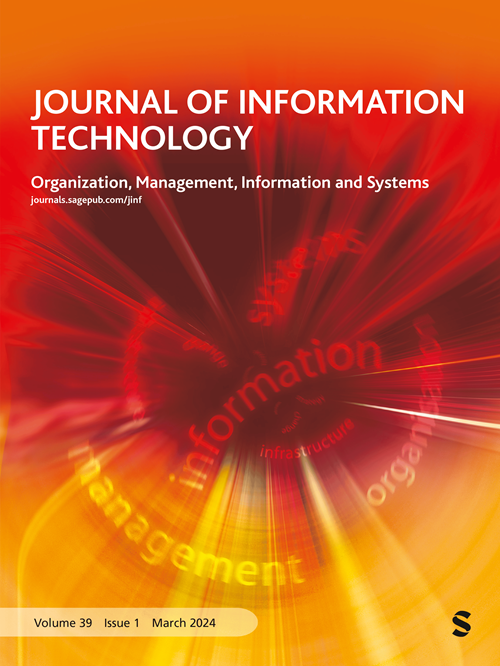实现对情境敏感的数字化转型概念化
IF 5.4
3区 管理学
Q1 COMPUTER SCIENCE, INFORMATION SYSTEMS
引用次数: 0
摘要
数字化转型是一种在组织、社会和个人领域的多种背景下都能感知到的现象。要将这一广泛的现象概念化,需要一种既能提供跨背景和跨领域的结构和可比性,又能包含足够的背景细节和特殊性以避免概念延伸的方法。本文采用多种方法,从一系列经验数据中汲取营养,为数字化转型提出了这样一种对情境敏感的概念。本文利用数字化转型的设计视角,(1) 建立了一个概念元结构,能够代表独立于领域和情境的数字化转型实例;(2) 为确定的元要素建立了一个特定情境类别分类法。元结构由表征、技术和效果(RTE)三要素构成,分类法由七个表征类别、十个技术类别和九个效果类别组成。我们在研讨会上采用卡片排序法对结果进行了评估。所提出的概念化能够在所有测试环境中适应数字化转型的具体环境表现,从而表明它可以作为对环境敏感的数字化转型概念化的基础。本文提供了一种概念元结构,能够以统一和结构化的方式捕捉跨领域和跨情境的数字化转型表现形式,为不断发展的数字化转型文献做出了贡献。本文章由计算机程序翻译,如有差异,请以英文原文为准。
TOWARDS A CONTEXT-SENSITIVE CONCEPTUALISATION OF DIGITAL TRANSFORMATION
Digital transformation is a phenomenon perceived across a multitude of contexts in the organizational societal and individual domains. Conceptualizing this broad phenomenon requires an approach that provides structure and comparability across contexts and domains whilst containing sufficient contextual detail and specificity to avoid conceptual stretching. Utilizing a multi-method approach this paper draws from a set of empirical data to develop such a context-sensitive conceptualization for digital transformation. Utilizing a design perspective on digital transformation this paper (1) develops a conceptual meta-structure capable of representing instances of digital transformation independent of domain and context and (2) develops a taxonomy of context-specific categories for the identified meta-elements. The three elements Representation, Technology, and Effect (RTE) constitute the meta-structure, the taxonomy is comprised of seven representation, ten technology and nine effect categories. We evaluated our results utilizing a card sorting approach in a workshop setting. The proposed conceptualization is capable to accommodate context-specific manifestations of digital transformation in all tested environments thereby indicating its applicability as a foundation for a context-sensitive conceptualization of digital transformation. The paper contributes to the evolving body of literature on digital transformation by providing a conceptual meta-structure capable of capturing manifestations of digital transformation in a uniform and structured manner across domains and contexts.
求助全文
通过发布文献求助,成功后即可免费获取论文全文。
去求助
来源期刊

Journal of Information Technology
工程技术-计算机:信息系统
CiteScore
10.00
自引率
1.80%
发文量
19
审稿时长
>12 weeks
期刊介绍:
The aim of the Journal of Information Technology (JIT) is to provide academically robust papers, research, critical reviews and opinions on the organisational, social and management issues associated with significant information-based technologies. It is designed to be read by academics, scholars, advanced students, reflective practitioners, and those seeking an update on current experience and future prospects in relation to contemporary information and communications technology themes.
JIT focuses on new research addressing technology and the management of IT, including strategy, change, infrastructure, human resources, sourcing, system development and implementation, communications, technology developments, technology futures, national policies and standards. It also publishes articles that advance our understanding and application of research approaches and methods.
 求助内容:
求助内容: 应助结果提醒方式:
应助结果提醒方式:


